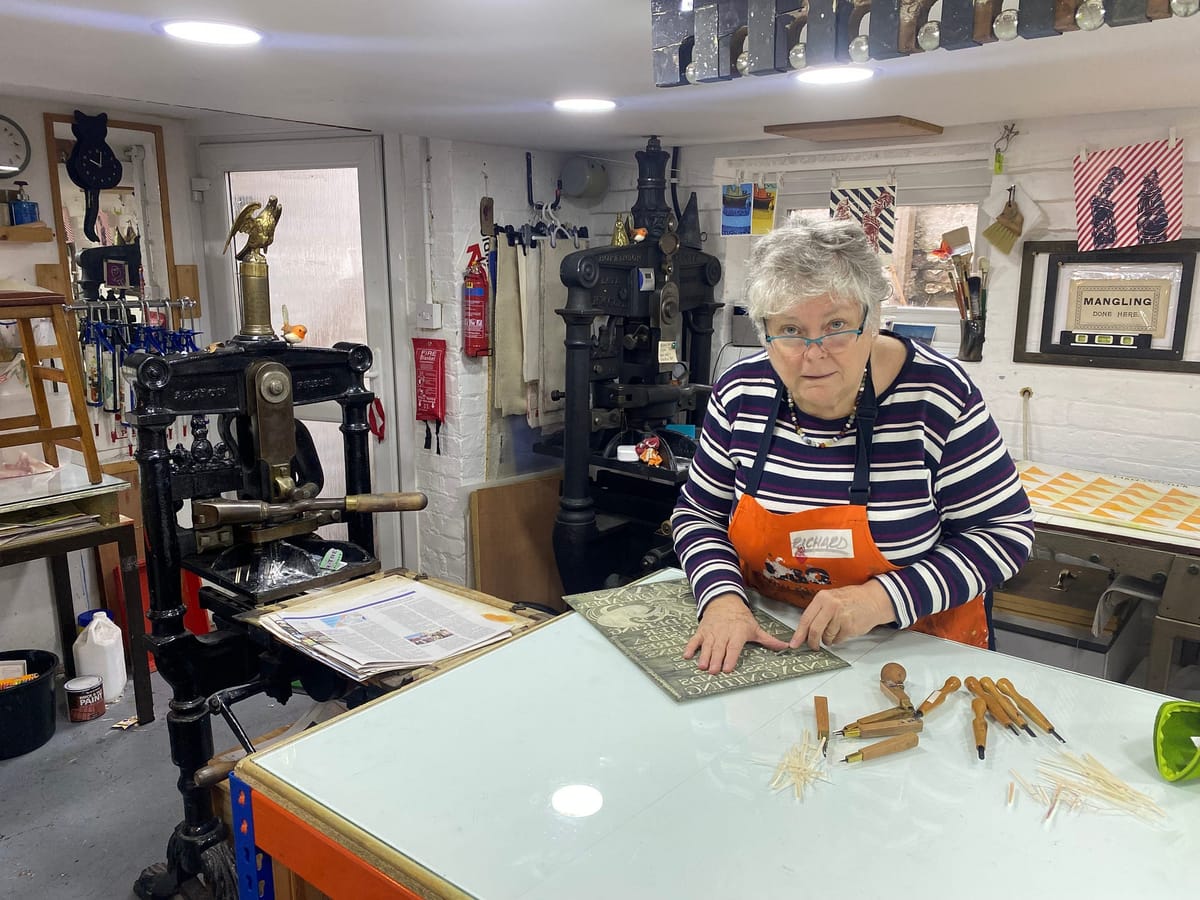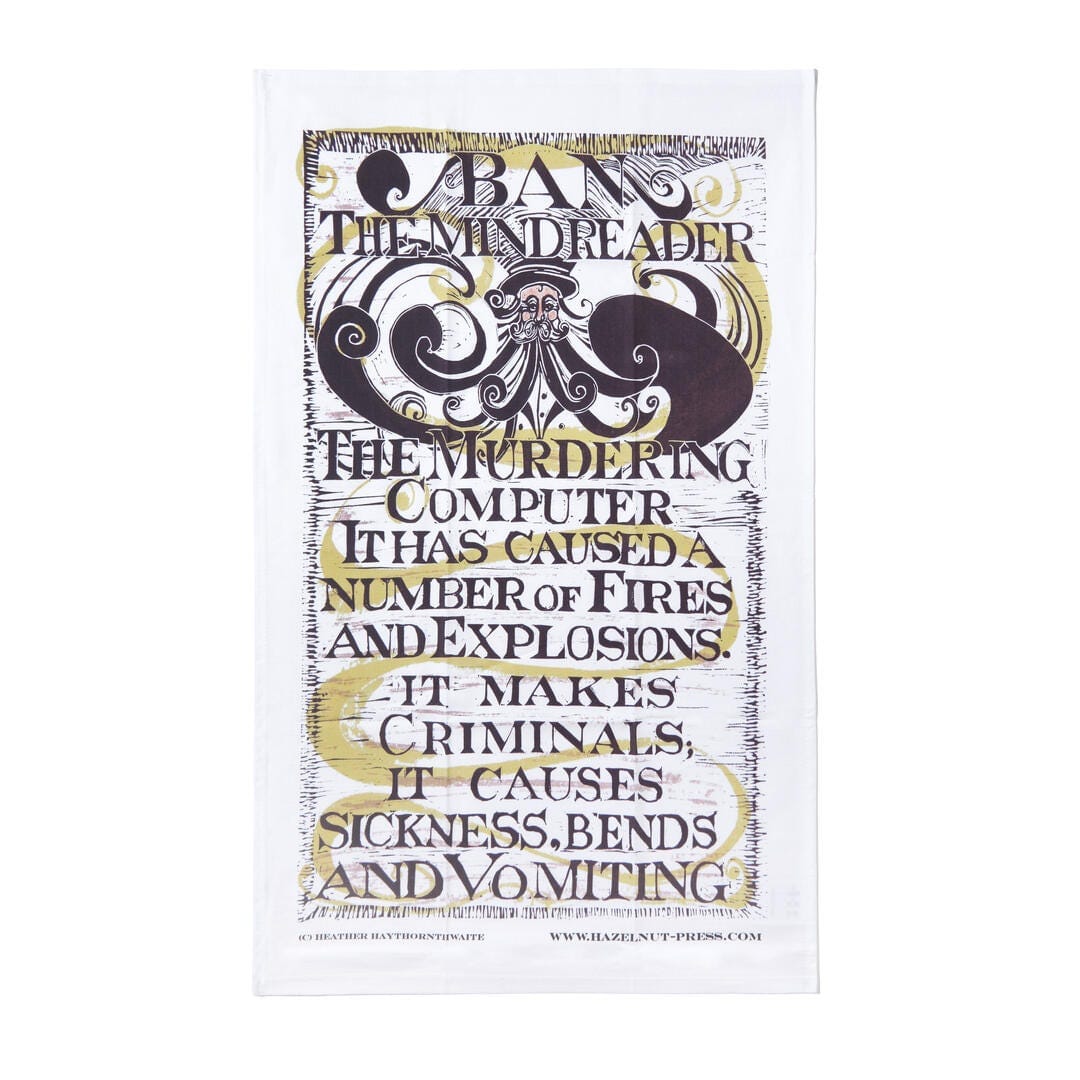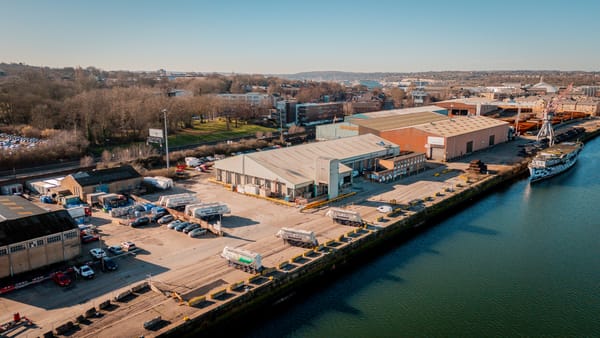“I enable people, I don't tell them what to do.”
What Steven asked Heather Haythornthwaite of The Hazelnut Press.

Heather Haythornthwaite is an experienced printmaker, exhibiting artist and art teacher. She owns and runs The Hazelnut Press from her studio in Rochester, Kent. Steven met Heather in her printing press workshop to discuss what brought her to Medway, why she got into printing, the council’s treatment of trees, and more.

Please spell your name for the record.
(laughs) Heather H A Y T H O R N T H W A I T E. I did marry Mr Smith, but I couldn't do it.
Where were you born?
I was born in Preston in Lancashire.
What jobs did your parents do growing up?
My dad was a doctor, my mum was a nurse. Dad did his national service in Canada because he wanted to see it. They were in Alberta with friends. He did his higher training in Preston, that's why I was born there, and the Canadian government got in touch with him and said, ‘We need someone with your skill set and would you come and work in Eastern Ontario?’ My mum was not that keen on where they were in Alberta. There's like polar bears and nothing. She didn't like it. We were sent to school in Dublin when we were teenagers. I always loved drawing and making. I had all these English storybooks and Giles cartoons. There was so much that was English, and it was illustrative and that was fabulous. And I thought, ‘Whatever way it works, I really want to go to art school in England’, and so I did.
Did you enjoy university?
Mostly, yeah, I did. I was in Bath. We had a good time. We didn't work very hard.
What brought you to the Medway Towns?
Two things. I was going out with a guy who was at art school in Maidstone. I needed a teaching job, because it was pretty well paid, and it gave me flexibility in the year. I wanted to be close enough to London that I could get illustration work or get some freelance work and I didn't want to be tucked away in the West Country. I'd been to art school in the West Country. I needed to be more east, and my boyfriend was at Maidstone. I wanted to be in a school with a pool because I knew I needed to keep fit and I’m quite lazy. I was shown plans for a pool and seduced into the job. The pool still doesn't exist. It was quite a fun job for two years. I was constantly evolving and learning, having done graphic design. What I didn't bank on was the way the school wanted me only to teach the least able and the least motivated. They all got pushed my way because there were very few women teachers in the school and we always were given the people that needed the most kindness. To get everyone that was tricky to teach or furious didn't help, but you build relationships. Then I realised that I had to move on. This was never going to be a space I would thrive in. I was always going to get the short straw, the men were always going to pick up the more challenging, interesting teaching possibilities and I was always just going to be the mammy. I wasn't having that.
I went to work at IPC, which used to be in Chatham. It was the handling house for women's magazines, and I became an offers controller. In the 1980s, there was a long tradition of sending away for things in women's magazines and you sent to Rochester. I became a buyer, and I was working on women's monthly titles, and I had to listen to the editors for what they wanted, and I had to listen to the manufacturers for what was cool, and I had to bring these two things together at the right price and enable the magazine to make money. It was such a lot of fun because I was on a salary I was never going to be hungry and it was a lark. Then when I was pregnant, I realized it was not really tiny person compatible, because I was in Yorkshire looking at cutlery and I was in Leicester looking at underwear and I was in Northampton looking at furniture. You can't do that and have a tiny child. I didn't have childcare, I didn't have my mother-in-law or anyone handy, so I stopped doing it and I did a bit of illustration for the cathedral and crept back to school. I started teaching excluded children after I had my second child. That was kind of tricky. I got nits a few times, got some fleas, found out a lot of stuff, got offered lots of illegal stuff. I helped a small number of people make really good changes in their lives. They learned how to read, or they could understand more about what they should or shouldn't do. I did things that were really positive, and it was a really worthwhile job even though sometimes it was a bit scary.
What is your official occupation?
Artist printmaker.
When did you set up Hazelnut Press?
2009. I'd been doing this for about a year. Nucleus had a shop, they had a property, they opened up to be like an art shop and if you helped, you paid less commission. I knew I could sell things and I loved talking. I volunteered and I had a couple of prints that kept me going for a long time. It was wonderful. Through Nucleus, which is a great organisation, I met and made many friends and through the art school, I did a 10-week evening course on entrepreneurship, on running a business and branding. I made super friends with people and learned a few things that just sharpened me up. I bought a better press, and I got this workshop set up.
What workshops do you run here?
Printmaking ones. I have maybe as many as a dozen people who come and go in the week. I enable people, I don't tell them what to do. I tell them how to make their ideas come together. People do very different things and their ability levels vary enormously, but they work as well as they can, work according to their own skills and inclinations and I have three people at a time. You meet some odd folk, but generally speaking, it works very well and that's what I've been doing for 10ish years, I guess. I carried on selling work at Nucleus and Francis Iles took me on. I'm sad they're gone because I earned heaps of money through them. It was magic. I was delighted to be part of the High Street and part of all that. And then I started printing in London for myself because you need to be challenged. When I go up there, I'm like the smallest potato in the stew pot, and it's good.
What does your average day entail?
The best 10 minutes of the day is when I’ve first woken up and I'm thinking up the best ideas of what I'm going to do. I try to get some drawing or making done every day, but it's more a question of the week. I try to do my own work for one or two days a week and I do one or two days with other people and then the rest of the time is taken up with family commitments and domesticity. I don't go too hard or too fast. I did in the past and it made me ill. I'm just trying to savour days. It's a nice, privileged, luxurious position to be in, with a paid mortgage and a healthy grandson.
On your website, I read, and I was hoping you could elaborate, you talk about ‘Stories that exist within the evolving urban environments.’
There's always a bit of gossip and there's always a bit of something going on that causes people to turn over ideas and possibilities, and those can become prints. My prints are never simply what you see. If they were I would take photographs. There’s always something more that keeps you interested. If you're going to buy a print, you're going to put it on the wall, you've got to like looking at it more than once. They've all got a bit of something. The one of Luton Arches, there's a man with two small dogs. I took the title from a book I enjoyed: ‘Started Early’. Where is he going and what is he up to? That sort of thing, I delight in it. You look through that arch, and you know, Chatham is beautiful. There's this curve in the road. There's a slope. There's a gentleness to it that you don't normally see, that's what I like to find. The same with the one called Magpie Hall, but it's actually Litmus Road. It's a lovely open space, there is a tree there which hasn't been killed, to my knowledge. It's a gentle place and at dawn, you know, it's beautiful around there and it's quiet and it's lovely and it's in this very densely housed area and yet it's a bit open. It's great, it's full of birds, it's lovely. Those little things are just cool.
What is ‘Ban the Mindreader’ why did you put it on a tea towel?
(laughs) When I came to the Medway towns first, I noticed at the flea market there were these crazy words along the wall. I couldn't quite read them and then I noticed when I walked on the Lines the same words were there and that freaked me right out. Then I found the same words were being removed from Upnor, the wall that surrounded some bit of the navy over there, and that really surprised me. I learned a bit more about it and it turned out the general thing I've heard is that there were old sailors who elected to do some psychotic drug testing and they had these clips put on their heads, went to a machine that recorded their responses, and they were injected with stuff. It seems that one guy attributed all the trouble to the computer that he was wired up to. And he went around writing about the mind reader, the murdering computer, when in fact, it was probably the medication he was taking on top of whatever post-traumatic situation he was in, and he probably didn't have all of his health anyway because he was the age he was and all that.





